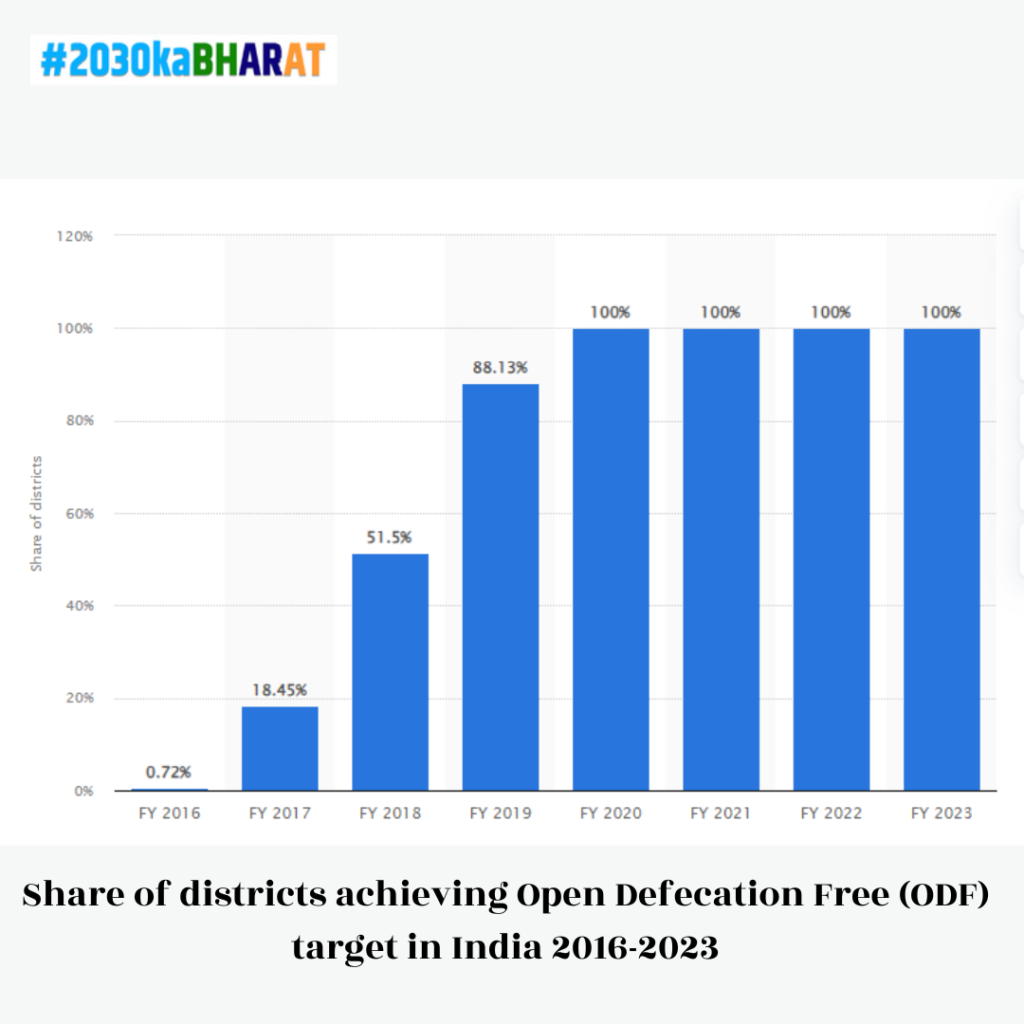In 2014, India witnessed the launch of a nation-wide movement that would not only transform its landscape but also resonate across the globe as a beacon of hope in the pursuit of a sustainable future. The Swachh Bharat Mission (SBM), a colossal undertaking aimed at eradicating open defecation and ensuring access to clean sanitation for all, embarked on a mission to rewrite the narrative of hygiene and public health in the country.
Aligning with a Global Vision:
At its core, the SBM is intricately linked to the United Nations Sustainable Development Goal 6 (SDG 6) – Clean Water and Sanitation. With a commitment to “ensure availability and sustainable management of water and sanitation for all by 2030,” SDG 6 stands as a critical pillar for a healthy and equitable world. The SBM, with its ambitious goals and unwavering focus, aligned perfectly with this global vision, paving the way for India to significantly advance its progress towards achieving SDG 6.
Eradicating Open Defecation: A Monumental Feat
Open defecation, a persistent challenge in India, posed significant health risks, environmental threats, and societal stigma. Prior to the SBM, nearly 59% of the rural population lacked access to proper sanitation facilities, resorting to open defecation in fields and public spaces. This not only compromised hygiene and dignity but also led to the spread of waterborne diseases like diarrhea and cholera.
Recognizing the urgency of this issue, the SBM set out to build toilets across rural India. The mission, fueled by community participation and government incentives, witnessed an unprecedented construction drive. Over 100 million individual household toilets were built, reaching even the remotest corners of the country. By 2019, a remarkable achievement was declared: India was officially declared Open Defecation Free (ODF), marking a historic chapter in its journey towards sanitation for all.
This remarkable feat has had a profound impact on public health. Studies have shown a significant reduction in waterborne diseases and improved hygiene practices, particularly among women and girls. The elimination of open defecation has also led to cleaner water sources and a reduction in environmental pollution, contributing to a healthier ecosystem.

Beyond Toilets: Embracing Holistic Sanitation
While eradicating open defecation was a pivotal milestone, the SBM’s vision extended far beyond simply building toilets. Recognizing the importance of a holistic approach to sanitation, the mission also focused on:
Solid Waste Management: Addressing the burgeoning challenge of waste disposal, the SBM launched initiatives like Swachh Survekshan, a city-level cleanliness ranking competition that incentivized effective waste management practices. Additionally, emphasis was placed on waste segregation and processing, transforming waste into valuable resources.
Behavioral Change: The SBM understood that lasting change could only be achieved through social transformation. Extensive awareness campaigns, community engagement programs, and educational initiatives were undertaken to foster positive hygiene behaviors and promote a culture of cleanliness.
Women’s Empowerment: Access to safe sanitation facilities significantly improved the lives of women and girls, particularly in rural areas. With increased dignity and safety, women gained greater control over their lives and participated more actively in community affairs.

Challenges and the Road Ahead:
Despite its remarkable achievements, the SBM continues to face challenges. Ensuring the sustainability of ODF status remains a crucial focus, requiring continued efforts to maintain proper toilet usage and hygiene practices. Additionally, urban sanitation presents its own set of challenges, with inadequate infrastructure and waste management systems requiring innovative solutions.
The SBM’s Phase II, launched in 2020, addresses these challenges by focusing on sustaining ODF status, promoting solid and liquid waste management (SLWM), and transforming villages into “ODF Plus” villages with enhanced sanitation facilities and hygiene practices.
A Model for the World:
The SBM’s success transcends national boundaries, serving as a model for other countries grappling with similar sanitation challenges. Its emphasis on community participation, behavioral change, and technological innovation provides valuable lessons for global efforts towards achieving SDG 6.
Several international organizations have recognized the SBM’s impact. The World Bank lauded it as “a global inspiration,” while the World Health Organization commended its contribution to public health improvement. As other countries embark on their own sanitation journeys, the SBM’s experience and expertise offer invaluable guidance and support.
A Legacy of Change:
The Swachh Bharat Mission is not just about toilets or cleanliness; it is a story of transformation. It is a testament to the power of collective action, unwavering commitment, and innovative solutions. In just a few years, the SBM has reshaped India’s sanitation landscape, leaving behind.
a legacy of improved public health, empowered communities, and a renewed commitment to environmental sustainability. The ripple effects of the SBM extend far beyond its primary goals, impacting lives in unexpected and profound ways.
Economic Benefits: Studies have shown that the SBM has generated significant economic benefits. The construction of toilets and sanitation infrastructure created millions of jobs, boosting the local economy. Additionally, improved health and hygiene have led to reduced healthcare costs and increased productivity, contributing to overall economic growth.
Environmental Impact: By eliminating open defecation and promoting proper waste management, the SBM has significantly reduced water pollution and soil contamination. This has led to cleaner rivers, healthier ecosystems, and a more sustainable environment for future generations.
Social Transformation: The SBM has empowered communities by fostering a sense of ownership and responsibility for sanitation. Community-led initiatives and local leadership have emerged, strengthening social bonds and promoting participatory governance. Moreover, improved sanitation has led to a decline in gender inequality, as women and girls gain greater freedom and safety.
A Global Inspiration: The SBM’s success has sparked a global movement for sanitation and hygiene. Countries across Africa, Asia, and Latin America are drawing inspiration from India’s experience, implementing similar initiatives and adapting the SBM’s strategies to their own contexts. This global solidarity and knowledge-sharing are crucial for accelerating progress towards achieving SDG 6 worldwide.
Looking Ahead: Building on Success
While the SBM has achieved significant milestones, the journey towards sustainable sanitation and complete water security is ongoing. The focus now shifts towards:
- Maintaining ODF Plus Status: Ensuring proper toilet usage, hygiene practices, and effective waste management systems remain critical to sustain ODF achievements.
- Addressing Urban Sanitation Challenges: Investing in infrastructure, technology, and community engagement is essential to tackle sanitation issues in rapidly urbanizing areas.
- Promoting Water Security: Access to clean and safe drinking water for all remains a critical challenge. The SBM’s principles can be applied to water resource management and infrastructure development.
- Innovation and Technology: Embracing innovative technologies like water purification systems, waste-to-resource solutions, and smart sanitation solutions can further enhance efficiency and effectiveness.
Conclusion: A Beacon of Hope
The Swachh Bharat Mission is more than just a national program; it is a symbol of hope and progress. It demonstrates what is possible when commitment, innovation, and community participation converge towards a common goal. As India continues its journey towards achieving SDG 6, the lessons learned from the SBM will continue to inspire and guide not just India but the entire world. By building on its success, the SBM can light the way towards a future where clean water and sanitation are a reality for all, leaving a lasting legacy of a cleaner, healthier, and more equitable world.
Official Swachh Bharat Mission Website
- This website provides comprehensive information about the SBM, including its goals, achievements, initiatives, and resources.
World Health Organization (WHO) Report on Sanitation and Hygiene
- This report provides a global overview of sanitation and hygiene challenges, highlighting the importance of initiatives like the SBM.
The World Bank’s Evaluation of the Swachh Bharat Mission
- This report provides an independent assessment of the SBM’s effectiveness and impact.
